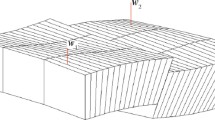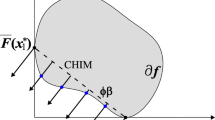Abstract
In conventional waterflooding of an oil field, feedback based optimal control technologies may enable higher oil recovery than with a conventional reactive strategy in which producers are closed based on water breakthrough. To compensate for the inherent geological uncertainties in an oil field, robust optimization has been suggested to improve and robustify optimal control strategies. In robust optimization of an oil reservoir, the water injection and production borehole pressures (bhp) are computed such that the predicted net present value (NPV) of an ensemble of permeability field realizations is maximized. In this paper, we both consider an open-loop optimization scenario, with no feedback, and a closed-loop optimization scenario. The closed-loop scenario is implemented in a moving horizon manner and feedback is obtained using an ensemble Kalman filter for estimation of the permeability field from the production data. For open-loop implementations, previous test case studies presented in the literature, show that a traditional robust optimization strategy (RO) gives a higher expected NPV with lower NPV standard deviation than a conventional reactive strategy. We present and study a test case where the opposite happen: The reactive strategy gives a higher expected NPV with a lower NPV standard deviation than the RO strategy. To improve the RO strategy, we propose a modified robust optimization strategy (modified RO) that can shut in uneconomical producer wells. This strategy inherits the features of both the reactive and the RO strategy. Simulations reveal that the modified RO strategy results in operations with larger returns and less risk than the reactive strategy, the RO strategy, and the certainty equivalent strategy. The returns are measured by the expected NPV and the risk is measured by the standard deviation of the NPV. In closed-loop optimization, we investigate and compare the performance of the RO strategy, the reactive strategy, and the certainty equivalent strategy. The certainty equivalent strategy is based on a single realization of the permeability field. It uses the mean of the ensemble as its permeability field. Simulations reveal that the RO strategy and the certainty equivalent strategy give a higher NPV compared to the reactive strategy. Surprisingly, the RO strategy and the certainty equivalent strategy give similar NPVs. Consequently, the certainty equivalent strategy is preferable in the closed-loop situation as it requires significantly less computational resources than the robust optimization strategy. The similarity of the certainty equivalent and the robust optimization based strategies for the closed-loop situation challenges the intuition of most reservoir engineers. Feedback reduces the uncertainty and this is the reason for the similar performance of the two strategies.
Similar content being viewed by others
References
Brouwer, D., Nævdal, G., Jansen, J.: Improved reservoir management through optimal control and continuous model updating. In: SPE Annual Technical Conference and Exhibition, Houston (2004)
Brouwer, D.R., Jansen, J.D.: Dynamic optimization of waterflooding with smart wells using optimal control theory. SPE J. 9, 391–402 (2004)
Sarma, P., Durlofsky, L., Aziz, K.: Efficient closed-loop production optimization under uncertainty. In: SPE Europec/EAGE Annual Conference, Madrid (2005)
Nævdal, G., Brouwer, D.R., Jansen, J.-D.: Waterflooding using closed-loop control. Comput. Geosci. 10, 37–60 (2006)
Jansen, J.-D., Bosgra, O.H., Van den Hof, P.M.J.: Model-based control of multiphase flow in subsurface oil reservoirs. J. Process Control 18, 846–855 (2008)
Jansen, J.D., et al.: Closed-loop reservoir management. In: 2009 SPE Reservoir Simulation Symposium, SPE 119098 The Woodlands, Texas (2009)
Lorentzen, R.J., Shafieirad, A., Nævdal, G.: Closed loop reservoir management using the ensemble Kalman filter and sequential quadratic programming. In: 2009 SPE Reservoir Simulation Symposium, SPE 119101. The Woodlands, Texas (2009)
Foss, B., Jensen, J.P.: Performance analysis for closed-loop reservoir management. SPE J. 16, 183–190 (2011)
Capolei, A., Stenby, E.H., Jørgensen, J.B.: High order adjoint derivatives using esdirk methods for oil reservoir production optimization. In: ECMOR XIII 13th European Conference on the Mathematics of Oil Recovery (2012)
Van den Hof, P.M.J., Jansen, J.D., Heemink, A.: Recent developments in model-based optimization and control of subsurface flow in oil reservoirs. In: Proceedings of the 2012 IFAC Workshop on Automatic Control in Offshore Oil and Gas Production, pp 189–200, Trondheim (2012)
Capolei, A., Völcker, C., Frydendall, J., Jørgensen, J.B.: Oil reservoir production optimization using single shooting and ESDIRK methods. In: Proceedings of the 2012 IFAC Workshop on Automatic Control in Offshore Oil and Gas Production, pp 286–291, Trondheim (2012)
Foss, B.: Process control in conventional oil and gas fields - challenges and opportunities. Control. Eng. Pract. 20, 1058–1064 (2012)
Rawlings, J.B., Mayne, D.Q.: Model predictive control: Theory and design. Nob Hill Publishing, Madison (2009)
Grüne, L., Pannek, J.: Nonlinear model predictive control theory and algorithms. Springer, London (2011)
Grötschel, M., Krumke, S.O., Rambau, J. (eds.): Online optimization of large scale systems. Springer, Heidelberg (2001)
Allgöwer, F., Zheng, A. (eds.): Nonlinear Model Predictive Control, vol. 26 Progress in Systems and Control Theory. Birkhäuser, Basel (2000)
Findeisen, R., Allgöwer, F., Biegler, L.T. (eds.) : Assessment and future directions of nonlinear model predictive control. Lecture Notes in Control and Information Sciences, vol. 358, Springer, Heidelberg (2007)
Magni, L., Raimondo, D.M., Allgöwer, F. (eds.) : Nonlinear model predictive control. Towards New Challenging Applications. Lecture Notes in Control and Information Sciences, vol. 384, Springer, Heidelberg (2009)
Lazar, M., Allgöwer, F. (eds.) : 4th IFAC Nonlinear Model Predictive Control Conference (NMPC’12). IFAC Noordwijkerhout, NL (2012)
Evensen, G.: Data Assimilation: The Ensemble Kalman Filter, 2nd edn. Springer (2009)
Biegler, L.T., Ghattas, O., Heinkenschloss, M., van Bloemen Waanders, B. (eds.): Large-Scale PDE-Constrained Optimization. Springer (2003)
Biegler, L.T., Ghattas, O., Heinkenschloss, M., Keyes, D., van Bloemen Waanders, B. (eds.) : Real-Time PDE-Constrained Optimization SIAM (2007)
Markowitz, H.: Portfolio selection. J. Finance 7, 77–91 (1952)
Terwiesch, P., Ravemark, D., Schenker, B., Rippin, D.W.: Semi-batch process optimization under uncertainty: Theory and experiments. Comput. Chem. Eng. 22, 201–213 (1998)
Srinivasana, B., Bonvina, D., Vissera, E., Palankib, S.: Dynamic optimization of batch processes: II role of measurements in handling uncertainty. Comp. Chem. Eng. 27, 27–44 (2003)
Van Essen, G.M., Zandvliet, M.J., Van den Hof, P.M.J., Bosgra, O.H., Jansen, J.D.: Robust waterflooding optimazation of multiple geological scenarios. SPE J. 14, 202–210 (2009)
Chen, C., Wang, Y., Li, G., Reynolds, A.C.: Closed-loop reservoir management on the Brugge test case. Comput. Geosci. 14, 691–703 (2010)
Peters, L., et al.: Results of the Brugge benchmark study for flooding optimization and history matching. SPE Reserv. Eval. Eng. 13, 391–405 (2010)
Evensen, G.: The ensemble Kalman filter: theoretical formulation and practical implementation. Ocean Dyn. 53, 342–367 (2003)
Wen, X.-H., Chen, W.H.: Some practical issues on real-time reservoir model updating using ensemble Kalman filter. SPE J. 12, 156–166 (2007)
Ehrendorfer, M.: A review of issues in ensemble-based Kalman filtering. Meteorol. Z. 16, 795–818 (2007)
Aanonsen, S.I., Nævdal G, Oliver, D.S., Reynolds, A.C., Valls, B.: The ensemble Kalman filter in reservoir engineering-a review. SPE J. 14, 393–412 (2009)
Simon, D.: Optimal State EstimationKalman, H\(_{\infty }\), and Nonlinear Approaches. Wiley, Hoboken (2006)
Rawlings, J.B., Bakshi, B.R.: Particle filtering and moving horizon estimation. Comput. Chem. Eng. 30, 1529–1541 (2006)
Wen, X.-H., Chen, W.H.: Real-time reservoir model updating using ensemble Kalman filter with confirming option. SPE J. 11, 431–442 (2006)
Sarma, P., Chen, W. Preventing ensemble collapse and preserving geostatistical variability across the ensemble with the subspace enkf. In: ECMOR XIII-13th European Conference on the Mathematics of Oil Recovery. Biarritx, France (2012)
Sarma, P., Chen, W.H. Robust and efficient handling of model contraints with the kernal-based ensemble Kalman filter. In: Reservoir Simulation Symposium. The Woodlands, Texas (2011)
Sarma, P., Chen, W. Generalization of the ensemble Kalman filter using kernels for nongaussian random fields. In: SPE Reservoir Simulation Symposium. The Woodlands, Texas (2009)
Chen, Y., Oliver, D.S., Zhang, D.: Efficient ensemble-based closed-loop production optimization. SPE J. 14, 634–645 (2009)
Chen, Y., Oliver, D.S.: Ensemble-based closed-loop optimization applied to Brugge field. SPE Reserv. Eval. Eng. 13, 56–71 (2010)
Lie, K.A., et al.: Open source matlab implementation of consistent discretisations on complex grids. Comput. Geosci. 16, 297–322 (2012)
Peaceman, D.W.: Interpretation of well-block pressures in numerical reservoir simulation with nonsquare grid blocks and anisotropic permeability. SPE J. 23(3), 531–543 (1983)
Suwartadi, E., Krogstad, S., Foss, B.: Nonlinear output constraints handling for production optimization of oil reservoirs. Comput. Geosci. 16, 499–517 (2012)
Schlegel, M., Stockmann, K., Binder, T., Marquardt, W.: Dynamic optimization using adaptive control vector parameterization. Comput. Chem. Eng. 29, 1731–1751 (2005)
Capolei, A., Jørgensen, J.B. Solution of constrained optimal control problems using multiple shooting and esdirk methods. In: American Control Conference (ACC), 295–300 (2012)
Bock, H.G., Plitt, K.J. A multiple shooting algorithm for direct solution of optimal control problems. In: Proceedings 9th IFAC World Congress Budapest, pp. 243–247. Pergamon Press (1984)
Biegler, L.T.: Solution of dynamic optimization problems by successive quadratic programming and orthogonal collocation. Comput. Chem. Eng. 8, 243–248 (1984)
Jansen, J.: Adjoint-based optimization of multi-phase flow through porous media - A review. Comput. Fluids 46, 40–51 (2011)
Sarma, P., Aziz, K., Durlofsky, L.J. Implementation of adjoint solution for optimal control of smart wells. In: SPE Reservoir Simulation Symposium, 31 January-2 Feburary 2005, The Woodlands, Texas (2005)
Jørgensen, J.B. Adjoint sensitivity results for predictive control, state- and parameter-estimation with nonlinear models. In: Proceedings of the European Control Conference 2007, pp. 3649–3656. Kos, Greece (2007)
Völcker, C., Jørgensen, J.B., Stenby, E.H. Oil reservoir production optimization using optimal control. In: 50th IEEE Conference on Decision and Control and European Control Conference, 7937–7943 Orlando, Florida (2011)
Byrd, R.H., Nocedal, J., Waltz, R.A.: Knitro: An integrated package for nonlinear optimization. In: Large Scale Nonlinear Optimization, pp. 35–59 (2006)
MATLAB. version 7.13.0.564 (R2011b) (The MathWorks Inc., Natick, Massachusetts, 2011)
Liu, Y.: Using the snesim program for multiple-point statistical simulation. Comput. Geosci. 32, 1544–1563 (2006)
Schölkopf, B., Smola, A., Müller, K.-R.: Nonlinear component analysis as a kernel eigenvalue problem. Neural Comput. 10, 1299–1319 (1998)
Kalman, R.E.: A new approach to linear filtering and predictions problems. J. Basic Eng. 82, 35–45 (1960)
Kailath, T., Sayed, A.H., Hassibi, B.: Linear Estimation. Prentice Hall (2000)
Jazwinski, A.H.: Stochastic Processes and Filtering Theory. Academic Press (1970)
Burgers, G., van Leeuwen, P.J., Evensen, G.: Analysis scheme in the ensemble Kalman filter. Mon. Weather Rev. 126, 1719–1724 (1998)
Wen, X.H., Chen, W.: Real-time reservoir model updating using ensemble Kalman filter. In: SPE Reservoir Simulation Symposium. The Woodlands, Texas (2005)
Gu, Y., Oliver, D.S.: History matching of the punq-s3 reservoir model using the ensemble Kalman filter. SPE J. 10, 217–224 (2005)
Chen, Z. Reservoir Simulation Mathematical Techniques in Oil Recovery. SIAM Philadelphia (2007)
Aziz, K., Durlofsky, L., Tchelepi, H.: Notes on petroleum reservoir simulation. Department of Petroleum Engineering School of Earth Sciences, Stanford University (2005)
Völcker, C., Jørgensen, J.B., Thomsen, P.G., Stenby, E.H. Simulation of subsurface two-phase flow in an oil reservoir. In: Proceedings of the European Control Conference 2009, pp. 1221–1226. Budapest, Hungary (2009)
Dehdari, V., Oliver, D.S.: Sequential quadratic programming for solving constrained production optimization – case study from Brugge field. SPE J. 17, 874–884 (2012)
Author information
Authors and Affiliations
Corresponding author
Rights and permissions
About this article
Cite this article
Capolei, A., Suwartadi, E., Foss, B. et al. Waterflooding optimization in uncertain geological scenarios. Comput Geosci 17, 991–1013 (2013). https://doi.org/10.1007/s10596-013-9371-1
Received:
Accepted:
Published:
Issue Date:
DOI: https://doi.org/10.1007/s10596-013-9371-1
Keywords
- Robust optimization
- Ensemble Kalman filter
- Oil reservoir
- Production optimization
- Automatic history matching




